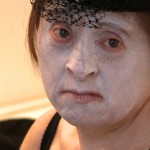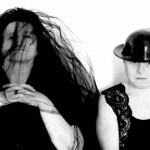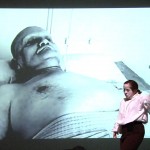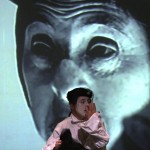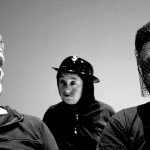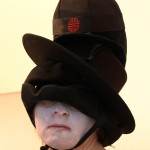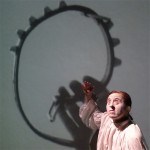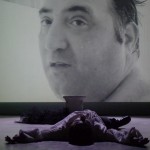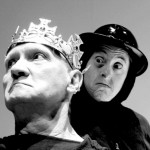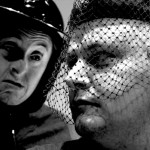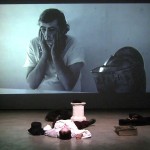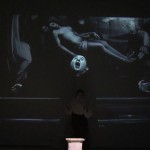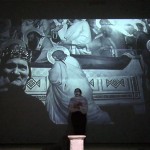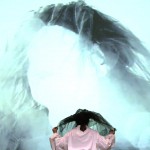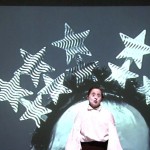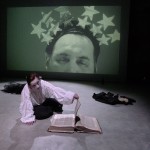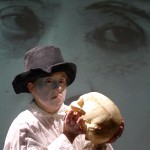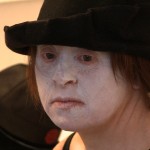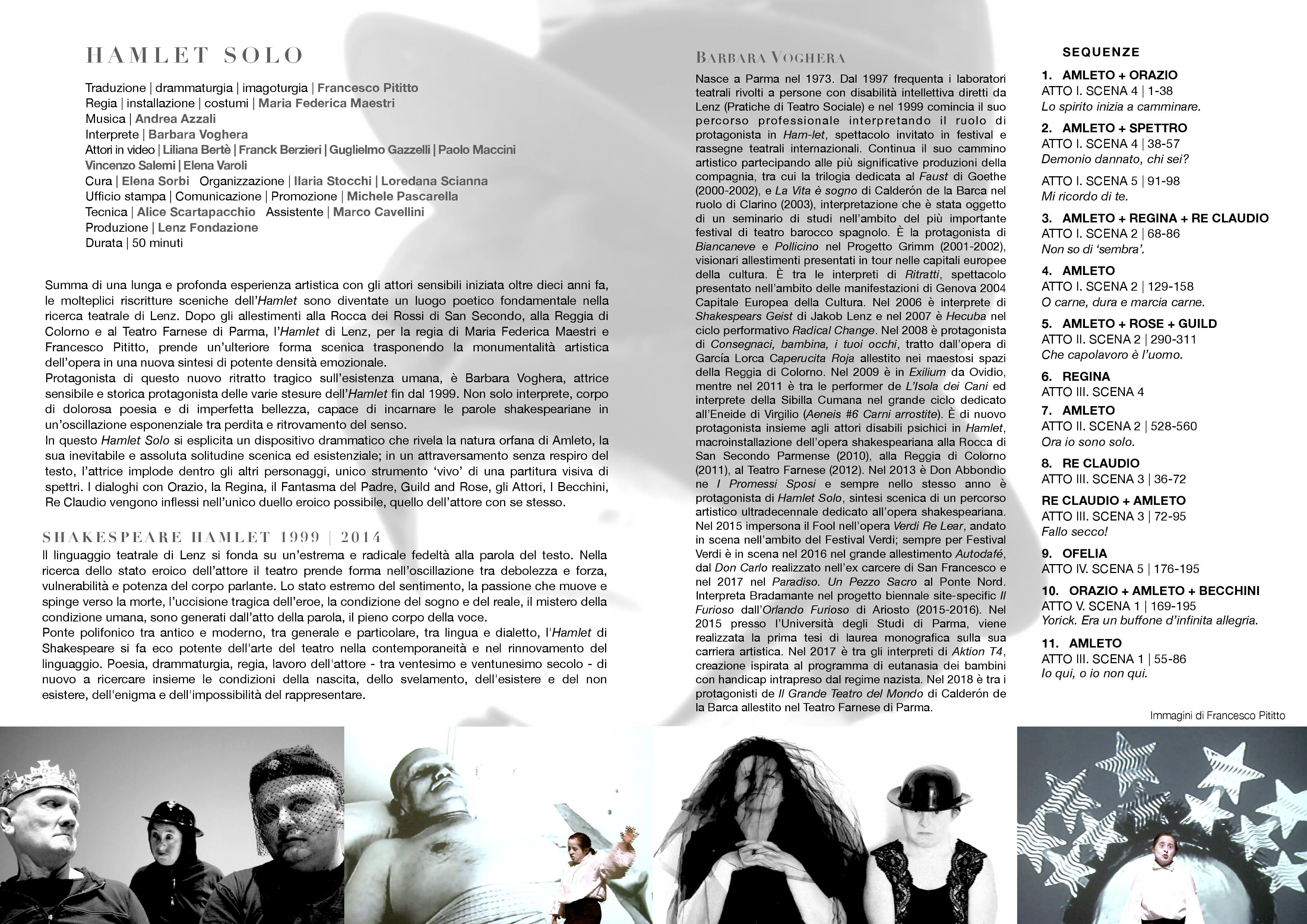
HAMLET SOLO
The multiple dramatic rewrites of Hamlet have become a fundamental place for Lenz’s theatrical research, thanks to the long and deep artistic experience with ‘sensible’ actors that began more than ten years ago. Following the shows at the Rocca dei Rossi di San Secondo (2010), at Reggia di Colorno (2011), and at the Teatro Farnese in Parma (2012), Hamlet, directed by Maria Federica Maestri and Francesco Pititto, takes yet another theatrical form, transposing the work’s monumental artistry in a new synthesis of powerful emotional density. Lenz’s Hamlets are listed on MIT’s website, Global Shakespeares – MIT – Massachusetts Institute of Technology.
The protagonist of this new tragic portrayal of human existence is Barbara Voghera, a sensible actress and an historic protagonist of the various editions of Hamlet since 1999. She’s therefore no longer an interpreter of the work, but holds a body of painful poetry and imperfect beauty, capable of incarnating Shakespearian words in an exponential oscillation between losing and finding reason.
In this new Hamlet Solo, dramatic devices are explicated, revealing Hamlet’s orphan nature and his absolute and inevitable scenic and existential solitude; cutting a breathless swath through the text, the actress implodes within the other characters, the only ‘living’ instrument in a score of spectres. The dialogues between Horatio, the Queen, the Father’s Ghost, Guild and Rose, the Actors, the Undertakers, and King Claudius become reshaped into the only possible heroic duel, that between the actor and himself.
Biographic notes upon Barbara Voghera
She was born in 1973, in Parma, affected by Down Syndrome. At the age of 23, she began to follow dance lessons, where she learned movement techniques. Since 1997 she attends theatrical workshops for people with intellectual disabilities, directed by Lenz (Pratiche di Teatro Sociale).
In 1999 she began her professional career by taking on the protagonist’s role in Ham-let, a show which was held at the most important festivals and theatrical exhibitions, among which were the Festival del Teatro d’Europa del Piccolo Teatro di Milano.
She continued her artistic pursuits by participating with her company’s most important productions, such as the trilogy dedicated to Goethe’s Faust (2000-2002), and Pedro Calderón’s de la Barca’s Life is a dream in the role of Clarino (2003), an interpretation which was studied in a seminary as part of the Festival di Almagro, the most important Spanish Baroque Theatre festival.
She was protagonist in Snow White and Tom Thumb in the Grimm Project (2001-2002), visionary productions presented on tour in the European capitals of culture, Lille, Madrid, Vigo, Olot, Arles, Evry, Roma, Padova, Milano. She was in the cast of Portraits, a show presented as part of the manifestations organized by Genova 2004 Capitale Europea della Cultura. She’s been an assistant in Lenz Rifrazioni’s workshops since 2005, Pratiche di Teatro and Pratiche di Teatro Sociale.
She was in Shakespears Geist in 2006, by Jakob Lenz. She was in Hecuba during the performative cycle Radical Change in 2007, and in 2008 she was the protagonist in Give us, little girl, your eyes a show inspired by the work of Garcia Lorca Caperucita Roja, held in the magnificent space of Reggia di Colorno. She was among the cast of Ovid’s Exilium in 2009, and in 2011 she was a performer in Isle of Dogs, meanwhile she played the role of the Sibilla Cumana during the long cycle dedicated to Virgil’s Eneide (Aeneis #6 Carni arrostite).
She was again protagonist of Hamlet, a great production of Shakespearian work, created in collaboration with the Department of Mental Health of the Ausl in Parma at the Rocca di San Secondo Parmense (2010), at Reggia di Colorno (2011), at Teatro Farnese and in the Palazzo della Pilotta Galleria Nazionale (2012). In 2013 she played don Abbondio in the retelling of Manzoni’s I Promessi Sposi, and now she is the protagonist of Hamlet Solo, an extraordinary dramathurgical, performative, and visual synthesis of Shakespearian masterwork. In 2014 she was the Fool in the creation Verdi King Lear | The Never Ending Opera , music by Robin Rimbaud aka Scanner. She was the subject of a thesis in 2015, “Barbara Voghera, sensitive actress. Lenz’s meeting with mental disorder”, at the Università degli Studi di Parma – Department of Letters, Arts, History and Society – Degree in Fine Arts and Performance. In 2017 she is one of the interpreters of Aktion T4, a creation based on the euthanasia program for children with handicaps carried out by the Nazi regime. In 2018, she is one of the interpreters of Il Grande Teatro del Mondo (The Great Theater of the World) by Calderón de la Barca, staged in the Farnese Theater in Parma.
HAMLET SOLO
From Hamlet by William Shakespeare
Creation | Francesco Pititto, Maria Federica Maestri
Translation, Dramaturgy and Imagoturgy | Francesco Pititto
Director, Installation and Costumes | Maria Federica Maestri
Music | Andrea Azzali
Performer | Barbara Voghera
Actors in video | Liliana Bertè, Franck Berzieri, Guglielmo Gazzelli, Paolo Maccini, Vincenzo Salemi, Elena Varoli
Shakespeare is stripped of the flesh, reduced to essentials, and returned through subject, color and perspective […] Maria Federica Maestri’s fiery direction seems not so much to communicate Hamlet’s struggle, but to build an atmosphere of decadent terror, a feeling of visceral death for a world already beyond the ability of changing it.
Matteo Brighenti, PaneAcquaCulture.it 22 December, 2015
It takes all of Lenz’s pragmatic sensitivity to give an indestructible classic such as Hamlet a hermeneutic thrust (namely, an unexpected interpretation) baffling as much as immediate. Hamlet’s drama is not the “romantic” to be or not to be, but to be or to become.
Giulio Sonno, PaperStreet.it, 29 November, 2015
No fiction, no rhetoric, just an emotional encounter with simultaneity and oneself […] “Hamlet Solo”, touching performance directed by Maria Federica Maestri with an excellent Barbara Voghera, sensitive actor who, with deep truth, embodied the painful poetry of Shakespeare’s words.
Mariacristina Maggi, Gazzetta di Parma, 29 September, 2014







